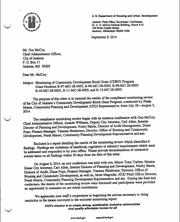This building, located at the corner of Farish and Amite streets, was under renovation by developer David Watkins for a B.B. King’s restaurant, but Watkins says foundation problems halted the project. Photo by Trip Burns.
The U.S. Department of Housing and Urban Development has lost faith that any progress will be made with the Farish Street revitalization project and wants the City of Jackson to repay $1.5 million used on the project. Furthermore, several key players have been suspended from participating in federal housing programs until further notice.
From July 28 to Aug. 5, HUD performed a monitoring review of the Farish Street project dating back to 1997. In April of that year, under the mayoral administration of Kane Ditto, a memorandum-of-understanding between the city and Jackson Redevelopment Authority stated that the city intended to purchase 17 properties on Farish Street with HUD community-development block grant (CDBG) funds to restore the historic street into an entertainment district. The city then transferred ownership of those properties to the JRA a quasi-independent arm of city government.
But HUD's review of the end use of the properties finds that the project failed to meet its stated national goal, the monitoring report states.
"It has been more than 16 years since the (city) began acquiring…property and it remains unclear whether or not the activity will ever meet a national objective," monitors wrote.
As a result, the city administration and HUD worked out a deal to pay $503,603 each year over three years, starting in December 2016. Part of HUD's difficulty in determining what if any national objectives the Farish Street project met comes from the lack of adequate documentation the city and the JRA kept to ensure the project complied with federal guidelines.
That MOU states that the city would oversee JRA in spending the funds, but documentation of such oversight is inadequate, HUD monitors observed.
In March 2002, JRA and a company called Performa, which redeveloped Memphis' Beale Street, entered into a lease agreement in which Performa received exclusive leasing and development rights in the Farish Street Entertainment District.
Six years later, in October 2008, Performa and a local group called Farish Street Group LLC (FSG), which developer David Watkins led, entered into an agreement in which FSG would take over the mortgages, up to $160,000 in debts that Performa incurred plus $425,000 in cash.
The project failed to hit its expected stride, and Watkins eventually fell out of favor with JRA, which yanked the master lease from Watkins' control in fall 2013, touching off a chain reaction of lawsuits, countersuits and finger-pointing.
Monitors from HUD highlighted some of the apparent conflicts of interest with Watkins and his employees, including Jason Goree, who currently serves as interim economic-development director in Mayor Tony Yarber's administration.
The monitoring report notes that Goree established a business known as Zac Harmon's Club LLC, which intended to enter into a lease with FSG to run a blues venue on Farish Street.
Records from the Mississippi secretary of state show that Goree is listed as the registered agent for the club and that the address listed for Goree, 300 W. Capitol Street, is the same as FSG and Watkins Development LLC.
As a result, federal officials have asked the city to suspend Goree, FSG, Watkins Development, and JRA from all HUD-funded programs. A message left for Goree at his city hall office was not immediately returned this morning; Lance Stevens, an attorney for Watkins, declined comment and said his client would issue a statement to the news media this afternoon.
Earlier this week, the city council voted to remove $79,998.88 in funding from the mayor's office—the amount of Goree's city salary—and apply it to the planning and development department. On Thursday, the city council confirmed the mayor's appointment of Eric Anthony Jefferson as director of Planning and Development. Jefferson is a transportation engineer and planner with Stantec Consulting. The city has 30 days—until Oct. 8—to comply with HUD's corrective action plan.





Comments